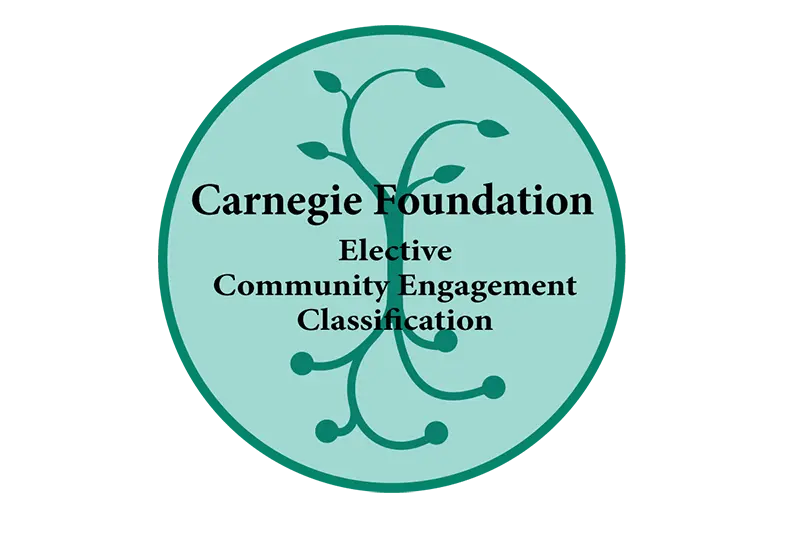Taylor University is one of 75 colleges and universities nationwide to achieve reclassification by the Carnegie Community Engagement Classification. The designation recognizes institutional commitment to community engagement, and is made by the Carnegie Foundation for the Advancement of Teaching.
Taylor’s first classification came in 2010. Additionally 44 other colleges and universities received first-time classification, bringing the overall total of institutions honored to 119 across the United States.
“The institutions that we are recognizing today are doing extraordinary work in addressing their societal responsibilities in and through community engagement and service. In doing so, they bring scholarship, knowledge, and expertise to bear in the address of real challenges in our communal lives,” said Paul LeMahieu, Senior Vice President at the Carnegie Foundation for the Advancement of Teaching. “They inspire us, even as they instruct us how to be our best selves in service to our communities. These are the very purposes for which the Carnegie Endorsement was established. Its execution, under the stewardship of the Howard Swearer Center and Brown University, has helped us fulfill that purpose for the greater public good.”
The Carnegie Community Engagement Classification is awarded following a process of self-study by each institution, which is then assessed by a national review committee led by the Swearer Center for Public Engagement at Brown University, the administrative and research home for the Carnegie Community Engagement Classification. The classification has been the leading framework for institutional assessment and recognition of community engagement in U.S. higher education for the past 14 years with multiple classification cycles in 2006, 2008, 2010, 2015 and 2020.
Among the 2020 recipients of the classification, 67 are public institutions and 52 are private. For Carnegie’s Basic Classification, 52 are classified as research universities, 39 are master’s colleges and universities, 22 are baccalaureate colleges, 3 are community colleges, and 3 institutions have a specialized focus—arts, medicine, and other health professions. They represent campuses in 37 states and U.S. territories.
“For 174 years, Taylor University has pursued its mission—to bring the light, truth, and love of Christ to a world in need,” said Dr. Ben Hotmire, Chair of Taylor’s Education Department. “We are grateful to God for this recognition by the Carnegie Foundation, that recognizes the efforts of our community members as we strive to live as Christ would have us live during these days.”
“These newly-classified and re-classified institutions are doing exceptional work to forward their public purpose in and through community engagement that enriches teaching and research while also benefiting the broader community,” noted Mathew Johnson, Executive Director of the Swearer Center. “We also note that many more institutions who are not receiving classification today are doing similar important work and we celebrate them as well,” Johnson added. “It is clear that many campuses are facing difficult times and finding it challenging to maintain and advance their community engagement in the current climate. It is our hope that by celebrating these classified campuses others might come to see community engagement as part of the strategy to address the current set of challenges in higher education.”
About the Carnegie Foundation for the Advancement of Teaching:
The Carnegie Foundation for the Advancement of Teaching is a nonprofit corporation founded by Andrew Carnegie in 1905 and chartered by an act of Congress in 1906. The Foundation, through the work of the Carnegie Commission on Higher Education created the Carnegie credit system to track progress through educational careers; completely transformed the nature of professional education in the professions (notably including medicine, education, engineering, and the clergy); and developed the first typology of American colleges and universities in 1970 as a research tool to describe and represent the diversity of U.S. higher education. The Carnegie Classification of Institutions of Higher Education (now housed at Indiana University—Bloomington’s Center for Postsecondary Research) continues to be used for a wide range of purposes by academic researchers, institutional personnel, policymakers, and others.
About the Swearer Center for Public Service:
In 1986, Brown University President Howard Swearer founded one of the first public service centers in the nation, now named for him—the Swearer Center for Public Service. The Swearer Center is a hub of community, scholarship, and action at Brown University. Through innovative programs and fellowships that reach across Rhode Island and around the globe, the Swearer Center connects people to co-create knowledge and positive social change, advances the field of engaged scholarship, and integrates social innovation with community engagement. In 2017, the Swearer Center became the administrative and research home of the Carnegie Community Engagement Classification.

